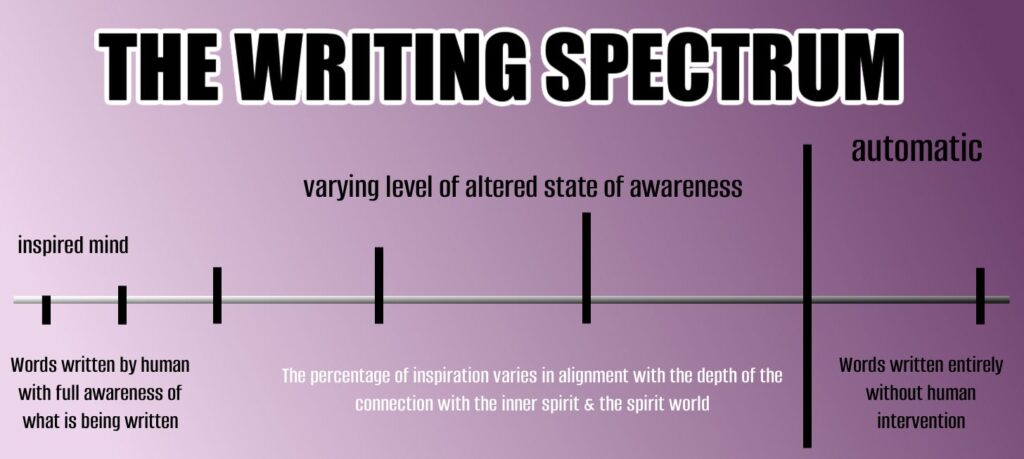The power of the written word is lasting. It is more powerful than spoken language. The words committed to paper have a depth of meaning rarely found in the voice. Each word is being translated by the reader’s inner voice with the intonation of their own personality. The source of those words, the writer, is making a communication that contains so much more than a bunch of letters arranged into words. They are communicating in the purest form.
For as long as mankind has been writing, the spirit world has utilised the written word for communication. Speaking through the pen their message often becomes clearer, deeper and more meaningful. More to the point, they remain written for all to read exactly as they were intended.
Of course, the written word is not the only way the spirit people can and do communicate with us. But for this article, the written word and the methods used are the subject.
There are countless examples of entire books being transcribed through the connection with the spirit world, and this is going back hundreds, if not thousands of years.
I found this example on Amazon UK
The words of The Emperor of Rome (331-363AD) transcribed by Thomas Cushman.
Here’s another example of a ‘dead’ man’s account of life in the spirit world
A Wanderer in the Spirit World
The words of a spirit person named ‘Franchezzo’ and transcribed by A. Farnese.
There are countless other examples of books, essays, poems and philosophical discussions penned by a medium and inspired by someone in spirit. It is not a rarity, only the use of the faculty is uncommon these days.
SCIENCE FOR EVIDENCE
One of the pillars of the religion of spiritualism is science. Spiritualist should be seeking the truth about the life after, backed with evidence. I have always made extra effort in my relationship with the spirit world to insist in validations wherever possible. But that alone should not be the overruling condition, merely a strong desire.
The science we seek to use in communicating with the spirit world is in the form of evidence. As I’m discussing the written communications, then I’ll stick to the science for these articles. To help understand the faculty of using writing, familiarise yourself with the following spectrum.

The normal writing of words we all partake in daily falls on the far left of the spectrum. It is from our inspiration, as are these words I’m writing now. Our mind is very much involved. We are forming sentences with the words we are familiar with that relay the message we want the words to relay. We have an awareness of the grammar, the shape, and the sound of what it is we’re writing.
The spirit communicator can ‘inspire’ our words at any level of awareness, even if we’re not inclined to be ‘listening’. This is easier to comprehend when you remember that your very own spirit is, of course, living in the spirit world. But be realistic, the spirit people aren’t going to hijack your mind every time you write, especially if you’ve not requested them to.
Our minds change, however, when we are focused on a single subject we’re writing about. We are concentrating on the words and the normal distractions of the mind are no longer in focus. We have changed the normal thought pattern of the mind like a beam of light becomes brighter and concentrated when we adjust the width of the light beam. We are therefore altering the normal pattern of thoughts. We are writing in an altered state of mind.
This is completely normal in many tasks we perform. When we concentrate our thoughts on a single topic, we inevitably change our minds. We dismiss the mind chatter, the stray and often pointless thoughts that fill any space in our thinking.
EXERCISE
Understanding this simple process matters, especially when it comes to intentionally working for spirit communications. To conclude this first part, here is a simple exercise for you to do.
Sit quietly with a notepad and pen at hand. Close your eyes for a few moments and take a few deep and deliberate long breaths in and long breaths out. Nothing more than that is expected.
On a clean page of the notepad, write the following (swapping my name for yours)
“My name is Trevor Baldwin and I am a student of the life working and communicating with the spirit world. I am hereby formally inviting my spirit guides to use my imagination when I sit for spirit writing from now onwards.”
That is the end of the exercise. Before you close the notebook, sit for a few moments and read what you’ve written back to yourself – aloud if possible.
How do you feel? Has anything changed?
I’ll answer that last question for you if you’re struggling for an answer. Yes – your intentions have now changed. Whenever you sit with that very same notebook and pen and repeat those preparations, the spirit world will be aware of your intentions.
At this stage, if you’re a complete beginner, you’re on that spectrum (see diagram above). Here’s the good news to finish with – moving along that spectrum is going to be a natural progression that may surprise you have freely you move.
In the second part, we’ll learn what exactly Automatic writing is and how it differs from inspired or spirit writing.











